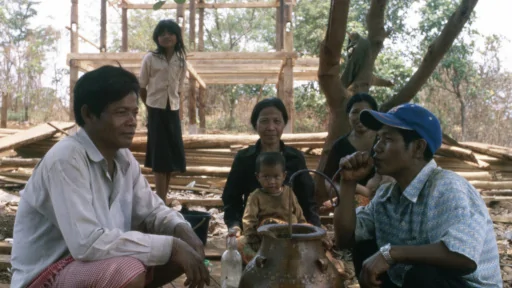Opinion Editorial Archive August, 2021: Château de Tampuan

Last month, we saw two events that brought us a small step closer to answering two of the oldest questions in our history: Can we reach for the stars? Are we alone in the Universe? Last month also saw two events that brought us no closer to answering a different question because we already know the answer: Can indigenous people trust their invaders?
On July 19, relatively little attention was paid to the first successful static fire test of the SpaceX Super Heavy booster rocket that will take us to Mars one day. That was largely because the flight of Blue Origin's New Shepard, scheduled for the following day, stole the headlines. Impressive as the successful New Shepard flight was, its significance was tiny by comparison. The static fire test was a huge milestone in human spaceflight to Mars.
At the same time NASA's Mars rover, Perseverance, was preparing to collect its first rock sample on the Red Planet. (It will complete that task in the next two weeks.) Along with further samples to be collected, it will be retrieved and brought back to Earth to be tested for signs of ancient life.
Earlier last month, it was reported that ten people had died in a village in rural Cambodia. The cause of death was consumption of homebrewed rice wine that had a lethally high concentration of methanol — a poisonous form of alcohol. Ironically, the rice wine was consumed at a funeral. I was reminded of the villagers in this month's photo. Many years ago, I was also in a rural Cambodian village. These indigenous Tampuan villagers were celebrating the first stage-completion of their new house. I hadn't intended to share their rice wine, but, when they offered it to me, it would have been insulting by me to refuse it.
I was also reminded of the many indigenous villagers around the world who are hesitant regarding Covid-19 vaccination. Another report last month documented the situation in Chiapas State, Mexico. It has a mainly indigenous population; it is also an area where I have visited many villages. The vaccination rate in the state is only about half that of the (already low) national average. A large part of the reason is the same ingrained, general mistrust of government and other institutions that we are seeing in many parts of the world. In this part of the world, though, that mistrust is largely justified.
Taken together, these stories can be viewed alongside the multiple, catastrophic climate change-related news stories from last month. We may be witnessing the beginning stages of the abandonment of our planet and the non-survivability of those left behind.
There is hope, of course. Last month I was able to visit a site in Iceland which is one of only a few places in the world where carbon dioxide is being removed from the atmosphere. Such efforts alone will not halt climate change, but they are a step in the right direction. Also last month (and not far from Iceland), the world's most powerful tidal turbine began producing carbon-free electricity.
It is ironic that a large part of Covid-19 vaccine hesitancy stems from a position of not knowing what the vaccines contain. Those ten people who died in Cambodia thought they knew what was in the rice wine they drank. Had their government taken regulation seriously, they could have been sure it was as safe as a Covid-19 vaccine.
Learn more about the Tampuan people.
If you enjoyed reading this month's opinion editorial, please consider supporting independent, advertising-free journalism by buying us a coffee to help us cover the cost of hosting our web site. Please click on the link or scan the QR code. Thanks!

